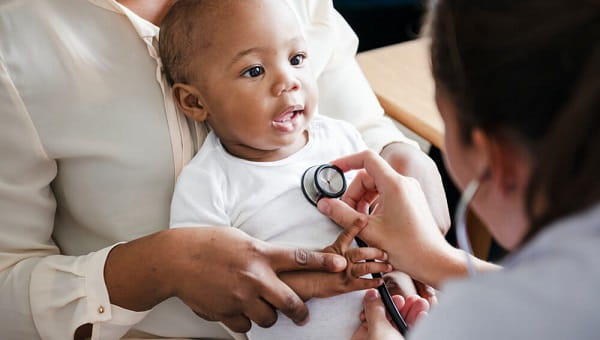Your 6-month-old is likely becoming a social butterfly—smiling, playing and “talking” to you whenever he or she can get your attention. These interactions are fun for all involved, and baby’s excitement can be contagious! When you go in for your little one’s well baby visit with the pediatrician, though, you may find that your normally chatty baby becomes shy or upset. Don’t worry; it’s normal for babies to only like “their people” at this age, and to want nothing to do with strangers.
What to expect
Like all well baby visits, this one will involve weighing and measuring your baby to make sure their growth is on track. The doctor will also examine your child all over, including the skin, eyes, ears, mouth, heart and lungs. Be prepared to answer questions about:
- How (and where) your baby sleeps
- Whether they have started solid foods
- If you’ve noticed any signs of teething
- Your baby’s movements and skills like rolling over, sitting up or holding objects
- The sounds your baby makes
- Whether your baby seems to see and hear normally
- Safety issues, including car seat safety and water safety, and household dangers like stairs, poisons and electrical hazards
- Your own well-being (if you’re the mother), as postpartum depression can become more noticeable around this time
Immunizations are no one’s favorite part of going to the doctor, but they’re critical to your baby’s health, both now and throughout their life. Six months is kind of a “biggie” for vaccinations, so you should expect your child to receive these:
- Third doses of rotavirus and Hib (depending on the types of vaccines given already)
- DTaP booster (the combination of diphtheria, tetanus and pertussis)
- PCV13 booster (protects against 13 types of pneumococcal bacteria)
- Polio
- Flu shot (depending on the season)
What to report
This is typically a very social time for babies, so if your child doesn’t babble, laugh or smile at you, or if he or she doesn’t show any interest in sounds or toys, you should mention it to the pediatrician just in case it might point to a problem.
What to ask
You probably have lots of questions, so be sure and make a list before your appointment with the pediatrician. Here are some questions to think about:
- How do I start solid foods and in what order?
- How often should I breastfeed once baby is eating solids?
- How can I make sure baby is getting the nutrients he or she needs?
- What foods should we avoid?
- What are the signs of a food allergy?
- How do I take care of baby’s new teeth?
And, of course, you should bring up any and all questions and concerns that you may have about your baby, yourself as a new parent, safety—pediatricians are used to parents asking all sorts of questions, especially new parents. There’s no reason to feel embarrassed for not knowing or understanding everything already, and there’s no such thing as a stupid question when it comes to the health and well-being of your baby.




